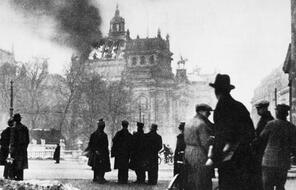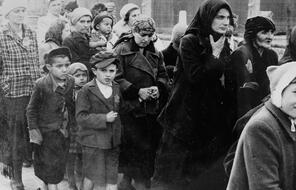Disillusion on the Battlefield
At a Glance
Subject
- History
- Human & Civil Rights
- The Holocaust
The soldiers who fought in World War I were profoundly affected by their experiences. For many of them, the reality of combat did not live up to their previous visions of the heroism and nobility of fighting for one’s country. The poetry and literature written by soldiers in World War I often painted those patriotic and militaristic beliefs as illusions.
British soldier Wilfred Owen wrote several poems about his experiences in the war in 1917 and 1918 (before he was killed in action), including the following poem that ends with a phrase in Latin that means, “It is sweet and fitting to die for one’s country.”
Bent double, like old beggars under sacks,
Knock-kneed, coughing like hags, we cursed through sludge,
Till on the haunting flares we turned our backs,
And towards our distant rest began to trudge.
Men marched asleep. Many had lost their boots,
But limped on, blood-shod. All went lame; all blind;
Drunk with fatigue; deaf even to the hoots
Of gas-shells dropping softly behind.
Gas! GAS! Quick, boys!—An ecstasy of fumbling
Fitting the clumsy helmets just in time,
But someone still was yelling out and stumbling
And flound’ring like a man in fire or lime.—
Dim through the misty panes and thick green light,
As under a green sea, I saw him drowning.
In all my dreams before my helpless sight,
He plunges at me, guttering, choking, drowning.
If in some smothering dreams, you too could pace
Behind the wagon that we flung him in,
And watch the white eyes writhing in his face,
His hanging face, like a devil’s sick of sin;
If you could hear, at every jolt, the blood
Come gargling from the froth-corrupted lungs,
Obscene as cancer, bitter as the cud
Of vile, incurable sores on innocent tongues,—
My friend, you would not tell with such high zest
To children ardent for some desperate glory,
The old Lie: Dulce et decorum est
Pro patria mori. 1
After the war, Erich Maria Remarque, who was wounded five times in battle, wrote the novel All Quiet on the Western Front based on his experiences as a German soldier. The novel’s protagonist, Paul, joins the German army, inspired by the patriotic fervor at the beginning of the war, but his experience leaves him disillusioned. In one passage from the novel, Paul describes the terror of the battlefield:
From a mockery the tanks have become a terrible weapon. Armoured they come rolling on in long lines, more than anything else embody for us the horror of war.
We do not see the guns that bombard us; the attacking lines of the enemy infantry are men like ourselves; but these tanks are machines, their caterpillars run on as endless as the war, they are annihilation, they roll without feeling into the craters, and climb up again without stopping, a fleet of roaring, smoke-belching armour-clads, invulnerable steel beasts squashing the dead and wounded—we shrivel up in our thin skin before them, against their colossal weight our arms are sticks of straw, and our hand-grenades matches.
Shells, gas clouds, and flotillas of tanks—shattering, corroding, death.
Dysentery, influenza, typhus—scalding, choking, death.
Trenches, hospitals, the common grave—there are no other possibilities. 2
Later, the character Paul anticipates the end of the war:
Everyone talks of peace and armistice. All wait. If it again proves an illusion, then they will break up; hope is high, it cannot be taken away again without an upheaval. If there is not peace, then there will be revolution . . .
Here my thoughts stop and will not go any farther. All that meets me, all that floods over me are but feelings—greed of life, love of home, yearning for the blood, intoxication of deliverance. But no aims.
Had we returned home in 1916, out of the suffering and the strength of our experience we might have unleashed a storm. Now if we go back we will be weary, broken, burnt out, rootless, and without hope. We will not be able to find our way anymore. 3
In the book, Paul is killed soon after writing these words.
Connection Questions
- What phrases from the poetry and literature excerpted in this reading stand out to you the most? What ideas, feelings, and images do those phrases communicate?
- What did Wilfred Owen and Erich Maria Remarque learn from their experiences in World War I?
- How do you think the leaders of England and Germany, during the war and after, might have responded to the ways that Owen and Remarque depicted the war? How might other British and German people have responded?
- 1Wilfred Owen, “Dulce et Decorum Est,” available at the Poetry Foundation website, accessed May 4, 2016.
- 2Erich Maria Remarque, All Quiet on the Western Front, trans. A. W. Wheen (New York: Ballantine Books, 1929, 1982), 282–83.
- 3Erich Maria Remarque, All Quiet on the Western Front, trans. A. W. Wheen (New York: Ballantine Books, 1929, 1982), 293–94.
Supporting Materials
How to Cite This Reading
Facing History & Ourselves, "Disillusion on the Battlefield," last updated August 2, 2016.








